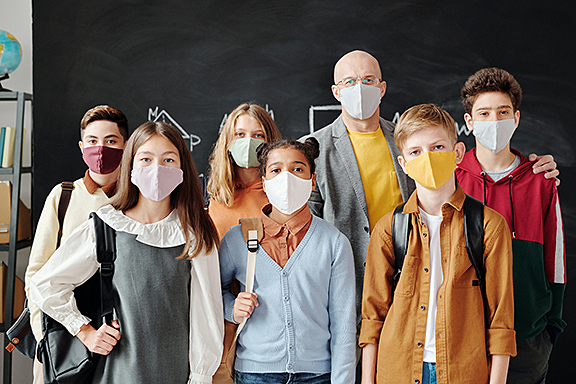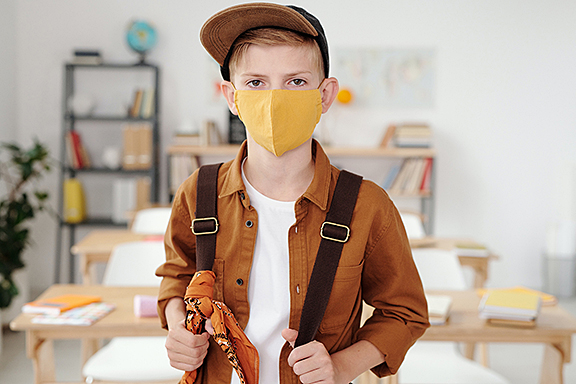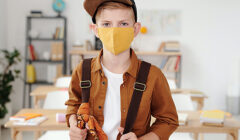School’s Always in Session
August is back to school season for many people. In August 2021, we are still surfing the waves of COVID 19. Should children wear masks? Should adults wear masks? Should children who are or aren’t vaccinated show up or not show up for in-person classroom learning? The discussions vary depending on where students live, how old students are, and what sort of school students attend. How people think about all of this is rooted in their own preconceived notions about health and education. Our preconceived notions reflect our individual states of mind based on our individual memory and understanding of how we learned what we learned. Knowledge builds on knowledge.
This much is fact: few of us have lived through anything exactly like the COVID 19 pandemic. We may have lived through worse personal health crises; many of us have. Nonetheless, the shared nature of COVID 19 and the COVID related social and economic shutdown is unique. We’re all learning as we go. Our leaders are learning as they go. The people who went before us learned as they went.
In these environs, September is back to school season.
I wonder how very young children are being wired cognitively and adapting emotionally while covering their own faces with masks amid masked adult faces.
I know children will understand that there are faces behind the masks. In child psychology, the term “object permanence” describes a child’s early and eventual understanding that objects and people continue to exist even though they can no longer be seen or heard. Everyone who has ever played a game of “peek-a-boo” with a very young child, can see for themselves how this works. Still masking one’s face masks one’s personal affect. How will children perceive the emotional signals inherent in facial expressions that are now hidden by medical masks?
An August 18 NY Times Op-Ed piece research psychologist Judith Danovitch dismisses such concerns, suggesting that looking into someone’s eyes is a better way to read someone else’s state of mind, and that mask wearing might help children learn. I’m quoting the article: “for older children, mask wearing is a way to teach
more sophisticated ethical concepts like duty and sacrifice. By age 7, for example, children believe that it feels good to make sacrifices on behalf of others in need. Stressing that the discomfort and inconvenience of mask wearing are forms of generosity and public service might motivate children to address other social problems in their lives, like bullying.”
My experience in co-dependency support groups tells me that it’s a lot, and not always good, to expect children to adapt to discomfort and further to be encouraged to “sacrifice” to “address” “social problems.” Such naïve, altruistic, well-intended children risk being bullied or worse by less “public service” minded members of their local communities. Compelling children to connect discomfort to some distant good can result in the kind of personal martyrdom that leads to other self-negating and self-destructive behaviors. There are books written about this stuff.

COVID 19 has involved individual and shared trauma. Ignoring the painful and helpless aspects of traumatic events creates more trauma. Part of why some traumatic situations continue to occur is because people are made to feel uncomfortable talking about personal discomfort.
I don’t like masks. I’ve been chided for saying I don’t like masks. I continue to wear masks when I’m required to wear a mask as well as when it might be advisable to wear a mask. In either case, I am not going to say I like wearing the mask.
Mask wearing is inconvenient and sometimes uncomfortable.
Why not just tell it like it is?
Data suggests that wearing face masks, together with more frequent hand washing, has led to a decrease in influenza and the common cold. That is good information for children to have. The CDC website states that common coronaviruses cause symptoms like the common cold. Sars-COV-2 is now the coronavirus commonly causing problems in our shared world. And, COVID 19 has certainly been more than inconvenient for many people. Being restrained and/or intubated traumatizes people in ways that until seemingly recently, weren’t well known or discussed. Importantly, but often still unacknowledged, impaired respiration and circulation impair brain function which in turn impairs a recovering person’s ability to actively seek new activities that might improve oxygen intake and physical, cognitive, and emotional comfort and well-being.
How will the neurons wire and fire in children trying to sit still and learn new information while breathing through face masks? I don’t know. I do hope that all of us get to get up and stretch and walk and breathe deeply. It all helps.











